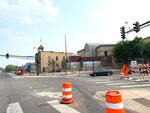By Cam Gordon
Police won’t be moving back into the Third Precinct building at East Lake St. and Minnehaha Ave. that was set ablaze after the murder of George Floyd by Third Precinct officers.
After looking at citizen comment, Mayor Jacob Frey and the Minneapolis City Council announced in July that they will delay plans to locate a new or renovated police station in the southside. Pending mayoral approval, they will not relocate law enforcement staff to the former station on East Lake St. and Minnehaha Ave.
This follows the July 17, 2023 release of a report about the public’s response to Mayor Jacob Frey’s announcement in March that the city would locate a Third Precinct police station at either the former site at 3000 Minnehaha, or four blocks away at 2600 Minnehaha.
At that time DeYoung Consulting Services (DYCS) was hired to gather community feedback. While doing so, DYCS was met with a groundswell of community concern and neighborhood opposition to either location.
The mayor announced his change of mind at a press conference on July 17, even before the report was released to the public. Council members discussed it at length following a presentation at a committee of the whole meeting on July 18.
Following the presentation and discussion, the council unanimously approved a motion made by Ward 8 Council member and president, Andrea Jenkins, to move forward with co-locating police department (MPD) staff currently assigned to the southside’s Third Precinct within “other precinct facilities” with a report to the council due by Sept. 5.
At the press conference the night before, Frey and Jenkins both indicated support for relocating Third Precinct staff to the downtown Century Plaza building at 330 S. 12th St., which will also be the new home of the First Precinct. The First Precinct includes downtown and the Cedar Riverside neighborhood. The Century Plaza building is not located in the southside’s Third Precinct area, but is closer than the City of Lake building (309 2nd Ave. S.) where the precinct staff currently operate out of.
At the July 18 meeting, the council also voted to refer a resolution, presented by Ward 2 Council member Robin Wonsley, request proposals for non-law enforcement development of the city-owned land at 2600 Minnehaha Ave S. to the council’s business inspections, housing and zoning committee meeting on July 25.
Wonsley also proposed that the city support a truth and reconciliation process by moving $555,000 from the police department to the department of race, equity, inclusion, and belonging for truth and reconciliation programming. It passed and was referred to the budget committee’s Aug. 1 meeting.
At the following council meeting on July 20, the council passed a resolution by Ward 9 Council member Jason Chavez to eliminate the former Third Precinct location at 3000 Minnehaha Ave. from any further consideration for a police precinct, and commit to not house any police facility or functions there.
NEIGHBORHOOD GROUPS REJECT CITY’S 2 OPTIONS, PROCESS
Last spring, after the two site options were announced, the Longfellow Community Council (LCC) board passed a resolution demanding a new timeline and process with a focus on restorative justice and defining a shared community vision for a new facility or facilities. Twenty neighborhood groups, businesses, and community organizations joined the LCC in rejecting any decision made through the city’s process.
“Today is a win based on community coming together and voicing their lack of confidence in the process created by the city,” said LCC Executive Director Rachel Boeke after the meeting on the 18th.
“Community said no to this process and lack of transparency. Community said no to these locations. Community clearly said that determining a location for a police station must come after police reform and community input on what the future of community safety should look like,” she said. “The city listened – for now. LCC will continue demanding that community be a part of each new process to unfold from here – determining a new community safety plan, deciding what should happen with the 3000 Minnehaha site to best serve the area, and establishing where and how police should be stationed across our community.”
The former police station is located in Ward 9. Jason Chavez, the area’s council member, was clear at the council meeting: “Under no circumstances should we rebuild a precinct at Lake and Minnehaha,” he said. “At the end of the day, it’s just wrong.
NEED FOR POLICE REFORM
The report covered more than just a station location.
Results from the three versions of the survey, five precinct-wide community meetings co-organized with LCC held in April, and eight smaller conversations targeted for senior, American Indian, Southeast Asian, Latino, LGBTQIA+, East African, and African American community members were analyzed. DYCS also identified several themes beyond location preferences.
They divided themes into strong, medium and weak based on the number of times it was brought up or recorded. Themes commented on more that 75 times was considered strong.
The consultants said that the themes “show that the city faces a more nuanced set of decisions around the Third Precinct rather than a simple decision between the original and new site.”
They found that many people believed that this process is being done in the incorrect order and that police reform and a truth and reconciliation process should come first.
A significant number of people (259 comments) considered the process to be inauthentic – with some believing a decision has already been made.
Many wanted alternative uses for the former site instead of an MPD building. Many commented about how the response of the city and MPD to the murder of George Floyd and the following unrest resulted in deep distrust of the city and MPD.
Another strong theme was that MPD is unresponsive, unhelpful, ineffective, overly aggressive, and generally does not perform their duties of responding to calls, and solving, or preventing crimes. The need for police reform and to transform the MPD into a community-supporting police force and that the current MPD “culture of corruption, violence, aggression, and racism is not sustainable and does not support public safety” were also strong themes.
At the meeting Ward 12 Council member Andrew Johnson, while critical of some survey data in particular, appreciated the analysis and highlighted “opportunities for conversations that need to happen.” These included reconciliation, how the community can influence the use future facilities to include a more consolidated and integrated approach to safety, and what to do with the former police station building.
“I was able to attend several of the meetings, and think that your report is very accurate,” said Ward 11 Council member Emily Koski. She directed questions to staff about how this decision could be informed by work being done in other areas, including recent discussions about community safety centers. Community Safety Commissioner Cedric Alexander (who has announced he is retiring) responded that the city could be “as creative as we want to be,” when developing such safety centers and that they could include “not just police but an array of community services.”
“Huge credit is due to community members who worked hard to engage with the process to ensure that the city didn’t manufacture consent for one of the location options,” Wonsley said. “Next, I am planning to refocus the conversation on what neighbors do want to see happen at 3000 Minnehaha.”





Comments
No comments on this item Please log in to comment by clicking here